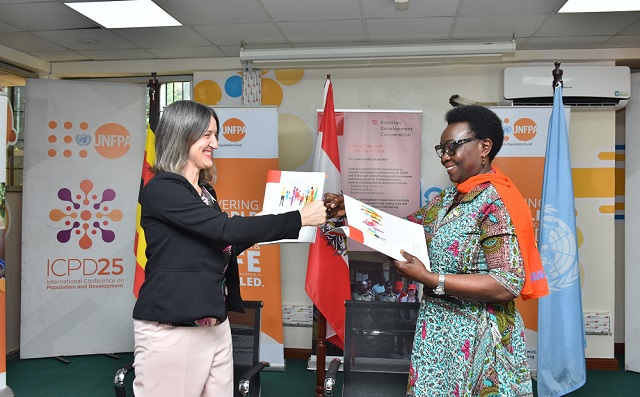
Kampala, Uganda | THE INDEPENDENT | The Austrian Development Cooperation (ADC) in Uganda is to provide over 11.7 billion Shillings towards the prevention of Gender-Based Violence in Karamoja and parts of Acholi.
The money, to be channelled through the UN Population Fund (UNFPA) Office in Uganda, will support a two-year project targeting women and young persons in six districts across Karamoja and Acholi. Girls and women will be empowered to exercise their rights and access Sexual Reproductive Health Rights SRHR, free from Gender-Based Violence.
Speaking at the signing of the project funding agreements in Kampala, the Representative of the Austrian Development Agency to Uganda, Dr Roswitha Kremser said efforts to end sexual violence in Karamoja and Acholi will fail unless the survivors are empowered to speak up and seek quick access to Justice.
The program will target six hard-to-reach districts in the Karamoja region, including Abim, Amudat, Moroto, Nakapiripirit, Kaabong and Napak; and three districts in Northern Uganda, including Omoro, Kitgum, and Otuke.
According to the UNFPA Country Representative Dr Mary Otieno, those districts have a sustained high fertility rate with low contraceptive use and high rates of teenage pregnancies. In the Karamoja region, the maternal mortality ratio stands at 700 deaths per 100,000 live births, in comparison to the national average of 336 deaths per 100,000 live births (UDHS 2016).
Dr Mary Oteino observes that the two regions are also marginalized, and have high teenage pregnancies, a contributing factor to maternal mortality. Records show that teenage pregnancy among girls aged 15 to 19, stands at 29.7 per cent in the Karamoja region in comparison to the national average which is still high at 25 per cent.
“We have actually seen an increase in teenage pregnancies from the national average of 7 per cent. So this is an area that UNFPA believes that we have to focus on,” explained Otieno. There are reports that districts like Amudat and Omoro have registered a 20 per cent increase in teenage pregnancies.
Today, Head of Office @ADCinUganda @KremserRoswitha and @UNFPAUganda Representative @otienoma have signed an agreement of EUR 3,030,000 to increase access to health services and justice for survivors of #SGBV Karamoja and northern Uganda.#16Days #OrangeTheWorld pic.twitter.com/Fr20kbBA9W
— UNFPA Uganda (@UNFPAUganda) December 8, 2022
“So even though other districts have seen an increase, Amudat and Omoro are the worst in terms of adolescent teenage pregnancies,” Said Dr Otieno. She explained that apart from marginalization, the higher rates of gender-based violence, justice, and justice institutions are lacking in the two regions.
Otieno told URN that access to justice, justice institutions and Sexual Reproductive Health Services are areas that have to be focused on if Karamoja and Acholi are not left behind in terms of national and global Social Development Goals (SDGs).
The Austrian Development Agency (ADA) in 2019 provided Euros 1.8 million (7 billion Shillings) part of which was channelled to the Justice Law and Order Sector (JLOS) and the judiciary for special courts for survivors of gender-based violence.
Rachel Ogola, the Gender, and Human Rights Specialist at UNFPA who has been heading the project told URN they will renew support to the judiciary to implement mobile court sessions for GBV survivors. The intervention will also involve the police forensics department to ensure what Ogola described as evidence-based prosecution of the perpetrators.
Even with previous funding and other intervention within the judiciary Karamoja and Acholi have been identified as some of the regions with a huge backlog of cases. It is estimated that over 6000 cases of gender-based violence have not been heard.
But according to Dr Roswitha, while the rate of case backlog remains a big challenge, it was observed that the conviction rates for gender-based violence perpetrators increased because of the presence and functioning of the special courts.
“We have realized that the SGBC courts are very good and very effective. They institutionalized specialized ways of dealing with complicated and very traumatizing court cases,” she said “So we are trying to work with the judiciary to institutionalize SGBV in the court System”
She says because of the slow pace of determining the cases under the normal sessions, victims of gender-based violence tend to lose interest in pursuing the cases and therefore leave the perpetrators to go scot-free.
*****
URN
 The Independent Uganda: You get the Truth we Pay the Price
The Independent Uganda: You get the Truth we Pay the Price



